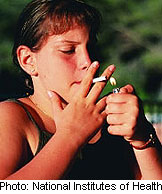
TUESDAY, July 30 (HealthDay News) — Poor children are more likely than their wealthier counterparts to smoke cigarettes, but less likely to binge drink and no more likely to use marijuana, a new study reveals.
The Duke University researchers also found that economic struggles early in life — such as family worries about paying bills or having to sell possessions for cash — can reduce a child’s self-control, even if they receive strong parenting during their teen years.
“Poverty during childhood not only appears to affect child development, but can have lasting effects on the types of health choices made during adolescence and early adulthood, especially as it relates to cigarette smoking,” study senior author Bernard Fuemmeler, an associate professor in community and family medicine, said in a Duke news release.
“Economic strains may shape an individual’s capacity for self-control by diminishing opportunities for self-regulation, or affecting important brain structures,” he suggested.
The study authors analyzed data collected from 1,285 children and caregivers in the United States between 1986 and 2009. Older teens and young adults who were poor in childhood were far more likely to become regular cigarette smokers than those who grew up in better-off households.
The participants who were poor in childhood also scored low on self-control measures, the investigators found.
“Poor self-control may be a product of limited learning resources and opportunities for developing appropriate behaviors,” Fuemmeler said.
Binge drinking, generally defined as having four to five alcoholic drinks in a row, was much more common among those who grew up in wealthier homes, the findings showed. Economic status during childhood did not appear to influence whether kids smoked pot. However, positive parenting was linked to a reduced risk of marijuana use.
In general, all young people whose parents were nurturing and accepting were less likely to smoke, drink or use marijuana, according to the study published July 30 in the Journal of Pediatric Psychology.
The findings challenge common beliefs about what leads to substance abuse, and may shed light on better approaches to help prevent young people from becoming drug and alcohol addicts, the researchers noted in the news release.
“We suspected we’d find a relationship between parenting and economic problems — the idea that economic strains may cause parents to have less capacity to deal with their children, but that relationship wasn’t there,” Fuemmeler said. “That means it’s not necessarily poverty that affects the parenting strategy, but poverty that affects the children’s self-control.”
More information
The Nemours Foundation has more about kids and smoking.
Copyright © 2026 HealthDay. All rights reserved.

